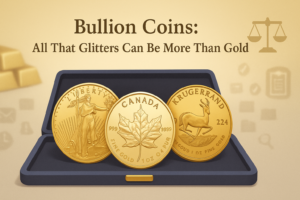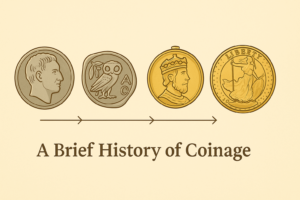Gold coins are not only fascinating items to collect, but they might also be exceptionally valuable. Naturally, if you trade or collect coins, you’ll want to maintain them in the finest condition possible. You’ve probably wondered whether you should clean your antique gold coins at some point.
So, we’re here to tell you all about the dos and don’ts of gold coin cleaning. Let’s dive in.
Why Does The Question Of Cleaning Gold Coins Come In The First Place?
You can own a wide variety of different forms of gold, and there is a broad range of motivations as well as techniques to take care of your precious metal.
- Investors often keep gold bullion in their homes for a long period of time as a measure of wealth protection. The finest care should be taken to maintain the luster and value of this gold.
When it’s time to start seeing a return on your investment, coin traders and investors are increasingly willing to purchase gold that has remained clean and well-maintained.
- Because gold coins are valuable as collectibles, numerous collectors keep collections of them. Coins that are rare or precious and have value above and beyond their mintage or their metal composition are referred to as numismatic coins.
Collectible coins hold a more nuanced value than gold bullion coins, which are valued according to the volume and quality of the metal. They can be unique varieties that are not struck anymore or antique coins with significant historical value.
Make sure to distinguish between bullion coins and collectible coins because they require different maintenance and cleaning procedures.
- Gold jewelry is possibly the most popular way for people to own gold. Since ancient times, gold has been used to make necklaces, earrings, rings, and other aesthetic adornments. Over 50% of the world’s demand for this precious metal is actually met by gold jewelry.
With so many reasons to purchase gold in 2023, it’s essential to be informed about the various ways to clean this precious metal. Continue reading to learn how to clean and maintain your gold bullion and collectible coins.
The Best Cleaning Method For Collectible Gold Coins
As you are already aware, there are various shapes and forms that gold may take, and each of these items requires a distinct cleaning method. An old, valuable gold coin cannot be maintained in the same manner as gold bullion or a gorgeous necklace.
Whether your gold is an investment or an heirloom, it needs to be handled, stored, and cleaned properly. The majority of gold ownership is the result of a significant time and financial investment. You should take the greatest possible care of this asset for your personal benefit.

‘So, let’s discuss the most efficient and safest method to clean gold collectible coins and bullion right away – ‘So, let’s discuss the most efficient and safest method to clean gold collectible coins and bullion right away –
Cautious Handling Of Gold Coins Comes Before Cleaning Them
The majority of flaws concerning gold coins are a result of improper handling. Preventing damage from occurring in the very first place is the first step of the gold cleaning approach. If you handle your gold with care, you may not need to clean it at all.
It’s crucial to devote the time to perform it properly when cleaning such a valuable asset as gold. Cutting corners can reduce the value of your gold, and damage during cleaning is the last thing you’d want.
To know more about the proper handling and storage of gold coins, read this.
A Step By Step Cleaning Method For Gold Coins
If you are certain that your gold coin requires cleaning, you may use a mild solution of dish soap and clean water. It is recommended to avoid cleaning rare coins, and especially antique gold coins, at all costs.
There’s always the option of taking your gold to a professional coin cleaner, where skilled professionals can restore shine and brilliance with a far lower risk of losing value.
If you choose to clean gold coins at home, here’s to do it –
Materials Required
- A plastic container
- Mild dish soap
- Clean warm water
- A soft-bristled brush or soft cloth (Just keep in mind the cautions regarding scratches. Never clean gold coins with anything that contains abrasives.)
- A microfiber towel
Caution
Always clean gold coins separately. Never put one coin with another.
Step-1:
Pour clean, warm water into your plastic container. If the water supply in your area contains a high level of minerals, you should use distilled water.
Step-2:
Mix in a few drops of dishwashing liquid.
Step-3:
Put the coin in the solution of water and leave it to soak for a while.
Step-4:
If required, gently remove the dirt away with a soft brush or cloth.
Step-5:
The coin should be rinsed in running water before being placed on a soft microfiber towel to air dry.
Should You Really Clean Old Coins?
Unbelievable as it may sound, the best way to care for old coins is to never clean them at all. If you collect old coins or wish to sell them, your initial inclination could be to try to make them as sparkling and attractive-looking as you can. However, the traces of antiquity are also part of the appeal of old coins, which is why you shouldn’t clean them.
Collectors assign grades to coins based on a variety of criteria, including the coin’s rarity, its date, the place where it was minted, and, of course, its condition. However, the coin’s condition is described as dents and wear, rather than its external appearances, such as grime and dirt.
Coin collectors are big fans of patina, the green film that grows on old metals over time as a result of exposure. It is advised to avoid cleaning rare coins because doing so could dramatically lower their value. Because of this, the majority of coin hobbyists hardly ever clean their coins. 99% of coins actually lose value after being cleaned, and many of them will be significantly so.
If you really want to try to tidy your coin collection, the absolute most you can do is give it a very gentle brushing or perhaps a quick water rinse. Coins should be left to air dry naturally without being rubbed. Coins that have been polished to a shiny finish employing silver or brass polish have lost a lot of their worth.
In Conclusion
From gold bullion acquired as an investment to heirloom antique collectible coins passed down through generations, all your gold items need care and attention.
For the best possible maintenance of your gold coins, adhere to my advice. By doing this, you’ll be able to keep this precious metal’s gorgeous brilliance and monetary value.
FAQs
Can You Clean Gold Coins Without Losing Value?
It’s possible to clean gold coins without diminishing their value if you keep the cleaning to a minimum level.
You can give your coins a quick rinse in distilled water and put them on top of the towel to air dry. In case of more stubborn dirt, you can put the coins in a bowl of distilled water and let them sit for a few minutes before drying them.
Avoid using any material with an abrasive surface. Also, it’s advisable to avoid regular tap water since the water supply in some areas contains a higher level of minerals that may react with gold if contacted.
Why Are Cleaned Gold Coins Worth Less?
It is not advisable to clean collectible or rare coins because doing so almost always decreases their value and very seldom enhances their grading. Even while it might appear that coin collectors would want glossy, brilliant coins, the majority actually prefer coins that are their natural hue.
Coins that are obtained straight from the Mint are unaltered. However, with older coins, abrasive cleaning methods are almost always utilized to make them brilliant and lustrous.
Scientifically speaking, a coin is susceptible to microscopic harm from anything that touches it. The likelihood that the coin’s upper surface will be removed by an abrasive cleaner increases, resulting in permanent damage.
The truth is, unlike other valuables like vintage automobiles or antiquated artworks, which fetch a greater price after being restored to their original condition, coins should maintain their aged appearance.
What Should You Not Clean Gold With?
Here are the things you should avoid while cleaning gold –
- Chlorine:
Gold can become permanently stained and damaged by chlorine. Considering this, keep anything containing gold away from cleaners that include chlorine.
- Abrasive Materials:
Abrasive cleaning agents and paper towels should not be used. These compounds have the potential to damage gold overlays and scratch gold surfaces.
- Any Soap With Unknown Ingredients:
While mild soap or detergent is OK to use in cleaning gold, avoid products with chemicals you don’t recognize because they might have the same impact as chlorine.
Does Coke Clean Gold?
Coke does clean gold, which is a useful and somewhat surprising trick.
You can thoroughly cover your gold by dipping it in a small container of Coke. After soaking the gold object in the liquid for ten minutes, rub it gently with a clean, soft cloth before rinsing it in distilled water.
Caution:
Remember to exercise caution while using this method on gold because, if left unattended for a long enough time, the acid from Coke may also peel paint and tarnish the metal. Rinse right away after removing the coin.
You might want to stick with cleaning coins with aluminum foil if you prefer something a little safer.
Why Should You Not Use Toothpaste To Clean Gold?
Your gold and silver may get damaged by toothpaste.
On the Mohs Scale of Hardness, toothpaste is abrasive with a hardness rating of about 3/4. Since softer metals like gold and silver are what most gold and silver coins and jewelry are made of, toothpaste can potentially scratch or damage them. Plus, the flavor oils included in toothpaste contain compounds that corrode metal.
So, when it comes to cleaning precious metals, you should rather stick to mild and safe cleaning agents specific to the type of metal.

![You are currently viewing How To Clean Antique Gold Coins Safely [Should You?]](https://coincollectorium.com/wp-content/uploads/2025/06/Antique-Gold-Coins.jpg)

